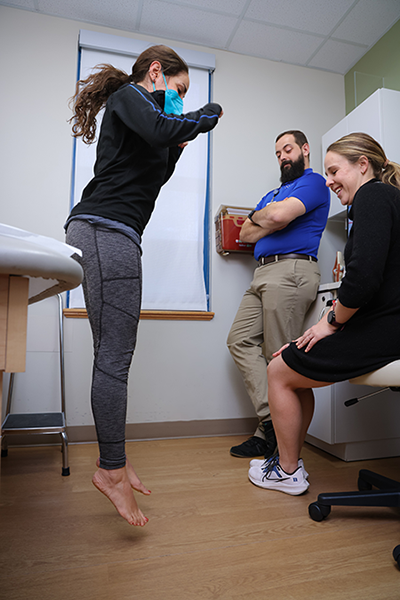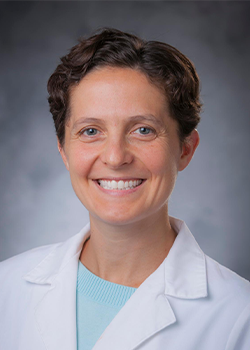
Innovative Program Offers Specialized Care for Female Athletes
Growing up in an active environment with a family that valued athletics, movement and physical activity has always been an important part of life for Kenzie Johnston, MD, assistant professor in family medicine and community health at Duke University School of Medicine.
In high school, Johnston ran track, played basketball, and volleyball. In college, she participated in several intramural and club sports. In medical school, she taught a cycling class and continues to cycle and run. “It has made me the person that I am today,” she said.
Helping other female athletes to keep moving and engaging in the activities they love is what motivated her and colleagues to revive the Duke Female Athlete Program in late 2023, which brings together 16 specialists from across Duke Health to provide a comprehensive approach to caring for women and girls involved in sports.
The program, unique in the Southeast, was created 20 years ago. It was revived in collaboration with the Duke Sports Science Institute (DSSI), which is a part of the Duke Department of Orthopaedic Surgery, and serves all female patients participating in recreational, collegiate, and professional sporting activities.
Research shows that women are more likely to experience certain sports injuries including ankle sprains, knee injuries like ACL tears and stress factors compared to men.
“Our hope is to make women their own agents of their health and provide them with good tools, so that they can take care of themselves,” said Johnston, a primary care sports medicine physician.
Passionate Medical Team with Athletic Backgrounds
Johnston serves on the core leadership team for the Duke Female Athlete Program that was instrumental in relaunching the program with a multidisciplinary team focused on the diverse needs of athletes.
Jennifer Ketterly, MS, RD, CSSD, LDN, instructor in the Department of Orthopaedic Surgery, serves as sports dietician. Laura Pietrosimone, PT, DPT, PhD, assistant professor in the Department of Orthopaedic Surgery, serves as a physical therapist and researcher. Jocelyn Wittstein, MD, associate professor of orthopedic surgery, along with Kendall Bradley, MD, assistant professor of orthopedic surgery, are orthopedic surgeons.
“This is a passion project for most of us,” Ketterly said.
Many of the providers were collegiate athletes themselves. Ketterly played basketball at Cornell University, Pietrosimone ran track at Duke, Wittstein was a gymnast at Cornell, and Bradley played soccer for the Blue Devils.

“We have this array of women who have a rich athletic background in terms of not only our academic interests, but also our experience,” Ketterly said.
“We know that caring for female athletes is different than caring for male athletes. They’re at higher risk for certain conditions and certain injuries,” Johnston said. “It's important to have a good understanding of how to prevent these injuries for women, how to rehab them or return them to sport in a thoughtful manner.”
Research shows that women are more likely to experience certain sports injuries including ankle sprains, knee injuries like ACL tears and stress factors compared to men.
This could be caused by several factors like differences in hormone levels and body mechanics. The Duke Female Athlete Program also offers concussion testing since female athletes are twice as likely to experience them compared to men in similar sports.
The team also consists of an endocrinologist, primary care sports medicine specialists, two OB-GYN practitioners, and additional physical therapists. One of the physical therapists specializes in running during pregnancy and returning to athletics after pregnancy and pelvic stabilization.
“We’re all working together across these disciplines, it’s not just one provider. I might see a female athlete first, but then I’ll send them to Dr. Johnston for lab work to look at their different biomarkers and performance biomarkers. Then, if that patient gets injured, they may need to have a surgical consult,” Ketterly said.
Shared care is a key component of the clinic.
“By creating this network of collaboration and bringing in anyone else who needs to be involved, we can make the care of a patient extremely cohesive and thorough,” said Wittstein, the orthopedic surgeon.
"So many aspects of these specialties intersect in women's musculoskeletal health, like intersections of hormones and the menstrual cycle with ligamentous laxity and bone density. We know risks for certain conditions are very specific to women versus men, so we just started bringing those components together,” she said.
Addressing Gaps in Sports Medicine
The program is modeled after those at hospitals in New York City, Boston Children’s Hospital and Stanford Medicine. “Our goal is to continue to advance the knowledge of how to care for female athletes and then continue to advance clinical practice from that,” Johnston said.
Alison Toth, MD, executive vice chair of the Duke Department of Orthopaedic Surgery, started the program in 2001.
“She led the first initiative for a female athlete clinic at Duke. This program is essentially a rebranding or a rebirth of it,” Johnston said. “She was one of the first individuals to really start to put focus and emphasis on the female athlete,” Ketterly said.
The core leadership team spent the past year renewing this effort. “We have a unique opportunity to contribute to this space because of our people, our resources, and our athletic backgrounds,” Ketterly said. “We feel like we’re the right people at the right time, at the right place, to do this very well.”
As the sports dietician, Ketterly treats patients for a wide variety of issues. On the sports medicine side, she treats patients for iron deficiency, fatigue, and Relative Energy Deficiency in Sport (RED-S), that arises when athletes do not consume sufficient energy through diet to meet the demands of their training.
On the sports performance side, she treats patients for hydration concerns in the summer, and those aiming to maintain lean body mass and reach body composition goals. Ketterly also creates guidelines for pre- and post-training and nutrient timing for patients.
In addition to patient care, the group prioritizes service, outreach, and research. Patients can access services through a recently launched website.
“As Division Chief, I am wholeheartedly behind it,” said Sports Medicine Chief and orthopedic surgeon Ned Amendola, MD, director of the Duke Sports Science Institute and chief medical officer for Duke Athletics. “I view it as imperative for educating and conducting research to optimize the health and performance of female athletes across various age groups and skill levels.”
The program relaunch comes as the conversation around sports medicine has begun to change in the industry.
“Over the last couple years, people have really highlighted the void of research and knowledge and recommendations on how to care for female athletes,” Johnston said.

Currently, just 6% of orthopedic surgeons in the United States are women and much of the research has been focused on male athletes, but that trend is slowly changing.
“There’s been a huge surge in the athletic and medical communities to try to change that and make sure we’re including women in research and doing women-only research, then deriving best clinical practices from that ongoing research,” Johnston said.
Wittstein plans to tackle the gap in athletic research and conduct sex-specific research on orthopedic conditions.
“Working together is stimulating other ideas,” she said. “Having the cross thinking between different specialties of medicine is also going to lead to future studies and new projects, which are going to benefit this population,” she continued.
Johnston believes news coverage in recent years is also partly responsible for bringing attention to the issue.
“High-level female athletes coming out and talking about their experiences, good and bad, and advocating for great robust care for female athletes has been really helpful,” she said.
Aiding Athletes On and Off the Field
Johnston typically treats patients for athletic-related sports injuries and runners at DSSI on Friday afternoons. She joined Duke in 2018 and serves as a physician for many of Duke’s female sports teams including, field hockey, women’s basketball and lacrosse, rowing, softball, and cross country.
“I originally chose to go into family medicine because I wanted to serve the whole person. Not just a component of a person, but the whole wellbeing of a person,” Johnston said.
But during medical school, Johnston fell in love with the idea of gaining additional training in sports medicine, which became the focus of her fellowship. “It would give me the additional tools I needed to help keep people moving and engaging in things they love,” Johnston continued.
“Now I have this cool job where I get to do a lot of musculoskeletal medicine and help get people moving a bit more, and doing things like walking, running and pickleball,” Johnston said. “I still practice full spectrum medicine though because I care for a lot of the varsity athletes, and I care for a lot of community athletes that have medical issues as well.”
Johnston said being a part of this program has been extremely rewarding. “It doesn’t feel like it’s a big lift because a lot of us just are very passionate about caring for female athletes and making sure that we’re providing good care,” she said.
The group has made great strides since they revamped the program and has already seen an increase in patients within the last few months.
However, they hope to collaborate with even more providers in the health care system and ensure patients know they can turn to the program to help keep them moving and engaging in activities they love.
Synclaire Cruel is a communication coordinator for the Department of Family Medicine and Community Health at Duke University School of Medicine.
Photography by Colin Huth of Huth Photo.
